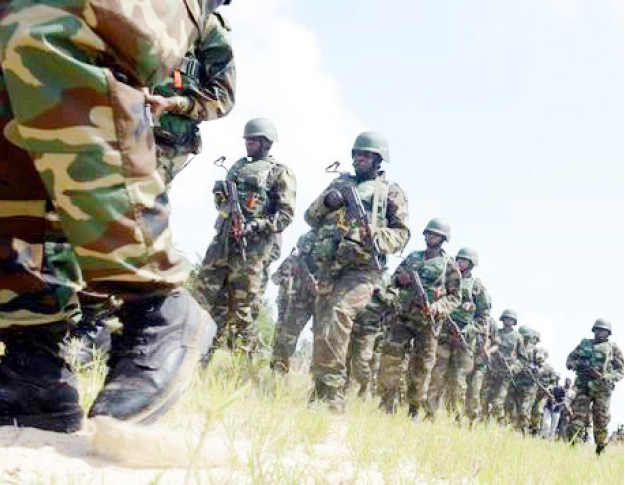The comprehensive review of Joint Task Force operations across Nigeria’s six geopolitical zones in 2024 presents a stark picture of both the military’s determined efforts to combat insecurity and the persistent challenges that continue to plague the country.
While the statistics are impressive – with over 8,658 terrorists neutralized, 12,538 suspects arrested, and 7,063 hostages rescued – these numbers tell only part of the story of Nigeria’s complex security landscape.
A deeper analysis reveals both encouraging progress and concerning patterns that demand attention beyond military solutions.
In the North East, Operation Hadin Kai’s neutralisation of 3,151 terrorists and the surrender of 16,171 Boko Haram/ISWAP fighters and their families suggest significant progress in degrading the insurgency that has plagued the region for over a decade.
The elimination of key terrorist commanders such as Amir Garin Manzo, Abu Mohammed, and others, alongside the recovery of substantial weapons caches – including 1,802 AK47 rifles and over 42,000 rounds of ammunition – indicates that the military’s strategy of targeting leadership structures while offering alternatives to foot soldiers is bearing fruit.
However, the continued presence of these groups, albeit weakened, reminds us that military success alone cannot address the root causes of extremism.
The operations in the North Central zone, through Operations Safe Haven and Whirl Stroke, demonstrate the military’s commitment to addressing the farmer-herder conflicts and banditry that have destabilised the region.
The neutralisation of 1,047 violent extremists and the arrest of 3,001 suspects reflect the intensity of these security challenges. The elimination of notorious leaders like Emmanuel Pam Dung and Isah Ishiyaku represents tactical victories, yet the persistent nature of these conflicts suggests that military intervention must be complemented by robust political and social solutions.
Perhaps most telling is the situation in the North West, where Operations Hadarin Daji and Whirl Punch collectively neutralised 3,648 terrorists and rescued 3,211 hostages. These numbers, while significant, underscore the endemic nature of banditry in the region.
The elimination of notorious kingpins like Isiya Boderi and Lawali Gudau represents tactical victories, but the continued emergence of new criminal leaders points to deeper socio-economic issues that require attention.
The recovery of 1,450 AK47 rifles and over 31,999 rounds of ammunition in this region alone highlights the scale of arms proliferation challenging our national security.
In the South South, Operation Delta Safe’s focus on crude oil theft yielded impressive results, with the prevention of over 56 million litres of crude oil theft and the destruction of 2,612 illegal refining sites.
This has contributed to increased national oil production, approaching two million barrels per day – a significant economic achievement.
However, the arrest of 2,357 individuals involved in oil theft indicates that economic sabotage remains a persistent challenge requiring more than military solutions. The destruction of 2,019 wooden boats and numerous illegal refining sites demonstrates both the scale of the problem and the military’s commitment to addressing it.
The situation in the South East, where Operation Udo Ka neutralised 734 terrorists and arrested 974 suspects, reflects the ongoing challenge of separatist agitations.
The recovery of 167 AK47 rifles, 259 pump action guns, and over 9,000 rounds of ammunition suggests a militarisation of political grievances that demands both security and political responses.
The successful operations in this region, while commendable, highlight the need for dialogue and political solutions to address underlying separatist sentiments.
These operations, while demonstrating the military’s capability and commitment, raise important questions about the sustainability of purely military solutions to Nigeria’s security challenges.
The large numbers of arrests and weapons recovered across all theatres suggest that the supply chains sustaining these security threats remain intact, pointing to the need for more comprehensive approaches to national security.
Moreover, the human cost of these operations – both to the military and civilian populations – cannot be ignored. While the statistics of neutralised terrorists and rescued hostages are encouraging, each number represents a human story and often a tragedy that might have been prevented through better governance and social interventions.
The successful rescue of over 7,000 hostages, while commendable, raises questions about the conditions that enable such widespread kidnapping in the first place.
The way forward demands a multi-faceted approach: strengthening local governance, addressing youth unemployment, improving education access, and fostering economic development in the affected regions.
The military’s successes must be consolidated through political solutions, community engagement, and economic empowerment programmes. This includes addressing the porosity of our borders, which facilitates arms trafficking, and strengthening intelligence gathering capabilities to prevent, rather than react to security threats.
Furthermore, the significant number of surrendered terrorists, particularly in the North East, suggests the effectiveness of non-kinetic approaches to counterterrorism. This success should inform strategies in other regions, where similar approaches might yield positive results.
As we acknowledge the military’s achievements in 2024, we must also recognise that true national security encompasses more than battlefield victories. It requires a comprehensive strategy that addresses both the symptoms and causes of insecurity.
The impressive numbers of neutralised threats and recovered weapons should serve not just as metrics of military success, but as indicators of the scale of our national security challenges and the urgent need for holistic solutions.





